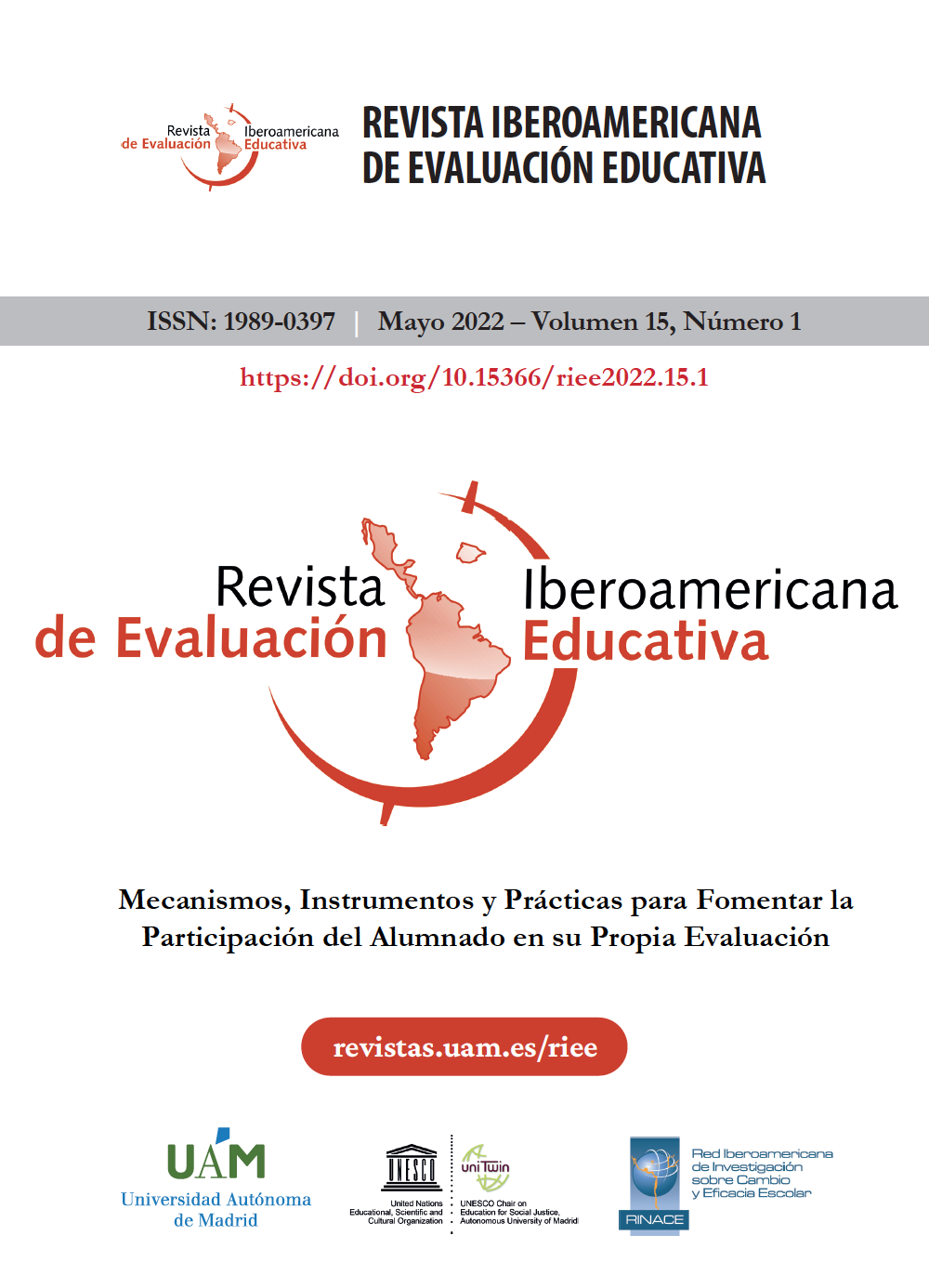Complicity between Self-Assessment and Learning. Tones for its Implementation in the University
Keywords:
Self-assessment, Self-regulation, Higher education, Formative assessment, Feedback
This work is licensed under a Creative Commons Attribution-NonCommercial-NoDerivatives 3.0 Unported License.
Abstract
Although the implementation of the European Higher Education Area has led to important changes in the educational processes at the University, assessment continues to be one of the pending subjects and, especially, one of its evaluative modalities, self-assessment. This article will present the arguments to try to awaken the complicity between self-assessment and learning. The voice of a sample of 250 university students of the Teaching Degree from various public universities in Spain will be heard. The results indicate, from the point of view of the students, that self-assessment is a revolutionary evaluative paradigm that requires training and strategies for its implementation. To change this situation, the nuances are presented to make it possible at the University. Envisioning the path to self-assessment as a strategy for and for learning should already be a reality in our university classrooms. Therefore, this article wants to be a call to reflection so that university teachers assume the participation of students in the assessment processes as a right of the student body, since it facilitates self-regulation and strategic learning throughout life, principally aspiration of university teaching.
Downloads
References
Ahumada, P. (2005). La evaluación auténtica: Un sistema para la obtención de evidencias y vivencias de los aprendizajes. Revista Perspectiva Educacional, 1,11-24.
Andrade, H. L. (2019). A critical review of research on student self-assessment. Frontiers in Education, 4, 87-102. https://doi.org/10.3389/feduc.2019.00087
Andrade, H. y Du, Y. (2007). Student responses to criteria-referenced self-assessment. Assessment and Evaluation in Higher Education, 32, 159-181. https://doi.org/10.1080/02602930600801928
Anijovic, R y Cappelletti, G. (2017). La evaluación como oportunidad. Paidós.
Bartolomé, A. y Grané, M. (2004). Educación y tecnologías, de lo excepcional a lo cotidiano. Revista Aula de Innovación Educativa,135, 5-13.
Boud, D. (1995). Enhancing learning through self assessment. Kogan.
Boud, D. y Soler, R. (2015). Sustainable assessment revisited. Assessment & Evaluation in Higher, 41(3), 1-14. https://doi.org/10.1080/02602938.2015.1018133
Boud, D., Lawson, R. y Thompson, D. G. (2013). Does student engagement in self-assessment calibrate their judgement over time? Assessment & Evaluation in Higher Education, 38(8), 941-956. https://doi.org/10.1080/02602938.2013.769198
Brown, G. T. L. y Harris, L. R. (2013). Student self-assessment. En J. McMillan (Ed.), The SAGE handbook of research on classroom assessment (pp. 367-393). SAGE. https://doi.org/10.4135/9781452218649.n21
Calatayud, M. A. (2007). La evaluación como instrumento de aprendizaje y mejora. Una luz al fondo” En M. A. Calatayud (Dir.) La evaluación como instrumento de aprendizaje. Técnicas y estrategias (pp. 37-51). Instituto Superior de Formación del Profesorado.
Calatayud. M. A. (2000). La supremacía del examen: La evaluación como examen. Su uso y abuso, aún, en la educación primaria. Bordón, 52, 54-63.
Calatayud, M. A. (2019). Orquestar la evaluación inclusiva en los centros educativos. ¿Por dónde empezar? Revista Internacional de Educación para la Justicia Social, 8(2), 165-176. https://doi.org/10.15366/riejs2019.8.2.009
Carless, D. (2015). Exploring learning-oriented assessment processes. Higher Education, 69(6), 103-123. https://doi.org/10.1007/s10734-014-9816-z
Condemarín, M. y Medina, A. (2000). Evaluación de los aprendizajes. Ministerio de Educación de Chile.
Fitzpatrick, B. (2006, 13 de febrero). Enseñar a los estudiantes jóvenes a autoevaluarse críticamente [Comunicación]. Reunión Anual de la Asociación Estadounidense de Investigación Educativa. Washington, DC.
Hounsell, D. (2007). Towards more sustainable feedback to students. En D. Boud y N. Falchikov (Ed.), Rethinking assessment in higher education (pp.101-113). Routledge.
Huber, G. L. y Güertler, L. (2015). AQUAD, 7. Ingerborg.
Ibarra, M. S y Rodríguez-Gómez, G. (2020). Aprendiendo a evaluar para aprender en la educación superior. Revista Iberoamericana de Evaluación Educativa, 13(1), 5-8.
López-Pastor, V. M. (2009). La evaluación formativa y compartida en docencia universitaria: Propuestas técnicas, instrumentos y experiencias. Narcea.
Murillo, F. J. e Hidalgo, N. (2016). Hacia un proceso de evaluación docente justo y socialmente justo. Revista Iberoamericana de Evaluación Educativa, 9(2), 5-8.
Murillo, F. J. e Hidalgo, N. (2018). Otra evaluación del desempeño docente es posible. Revista Iberoamericana de Evaluación Educativa, 11(2), 5-7.
Nicol, D. y Macfarlane-Dick, D. (2006). Formative assessment and self-regulated learning: A model and seven principles of good feedback practice. Studies in Higher Education, 31, 199-218. https://doi.org/10.1080/03075070600572090
Panadero, E. y Alonso-Tapia, J. (2013). Las rúbricas vs. los guiones de autoevaluación afectan la autorregulación, el desempeño y la autoeficacia en los docentes en formación. Semental. Educación y Evaluación, 39, 125-132.
Panadero, E., Brown, G. L. y Strijbos, J. W. (2016). El futuro de la autoevaluación de los estudiantes: una revisión de las incógnitas conocidas y las posibles direcciones. Educational Psychology Review, 28, 803-830.
Panadero, E., Jonsson, A. y Botella, J. (2017). Effects of self-assessment on self-regulated learning and self-efficacy: Four meta-analyses. Educational Research Review, 22, 74-98. https://doi.org/10.1016/j.edurev.2017.08.00
Pegalajar, M. C. (2021). La rúbrica como instrumento para la evaluación de trabajos fin de grado. REICE. Revista Iberoamericana sobre Calidad, Eficacia y Cambio en Educación, 19(3), 67-81. https://doi.org/10.15366/reice2021.19.3.005
Rodríguez-Gómez, G. y Ibarra, M. S. (2015). Assessment as learning and empowerment: towards sustainable learning in higher education. En M. Peris-Ortiz y J. M. Merigó Lindahl (Eds.), Sustainable learning in higher education. Developing competencies for the global marketplace (pp. 11-31). Springer. https://doi.org/10.1007/978-3-319-10804-9_1
Rodríguez-Gómez, G., Ibarra, M. S y Gómez-Ruiz, M. A. (2011). E-autoevaluación en la universidad: Un reto para profesores y estudiantes. Revista de Educación, 367, 35-46.
Sambell, K., McDowell, L. y Montgomery, C. (2013). Assessment for learning in higher education. Routledge. https://doi.org/10.4324/9780203818268
Sanmartí, N. (2021). Evaluar y aprender: Un único proceso. Octaedro.
Soto, E., Serván, M. J. y Pérez, A. I. (2013). Lesson study (LS) as a strategy to reconstruct teachers’ practical knowledge. WALS.
Zimmerman, B. (2000). Self-regulating intellectual processes and outcomes: A social cognitive perspective. En D. Dai y R. Sternberg (Eds.), Motivation, emotion, and cognition: Integrative perspectives on intellectual functioning and development. Lawrence Erlbaum Associates.
Zimmerman, B. y Schunk, D. (2011). Handbook of self-regulation of learning and performance. Routledge.

